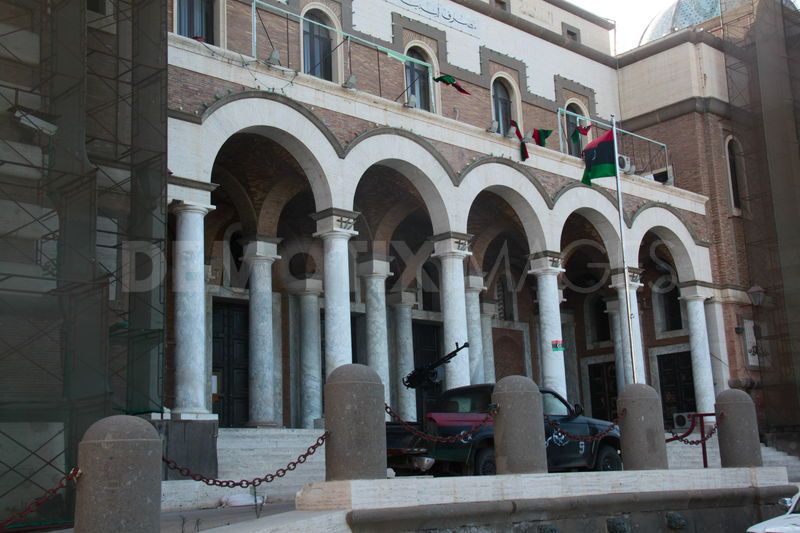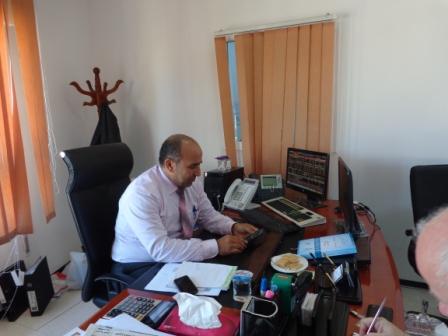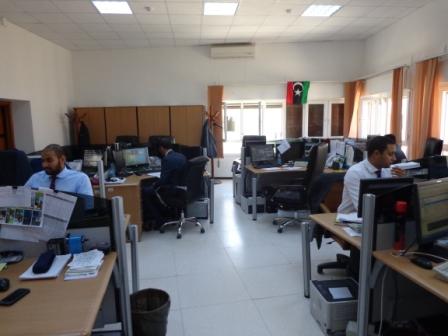By Michel Cousins.

Tripoli, 6 April 2014:
The Central Bank of Libya (CBL) has enough reserves to fund Libya for another three years . . .[restrict]without earning anything from oil sales, the bank’s head of reserves has said.
“We have enough funds for three years without getting a single US cent from oil,” Musbah Alkari has told the Libya Herald. The bank had “more than $115 billion (LD 142 billion) in foreign currency reserves” placed outside the country, he said – in banks such as HSBC, Bank of New York, Barclays and through clearers such as Clearstream. Around 60 percent of it was in dollars, the rest mostly in euros and sterling.
Add to this the reserves of around $50 billion (LD 62 billion) of the Libyan Investment Authority (LIA), Alkari said, and there was enough for around four and a half year’s spending without any oil being sold.
Reports of Libya running short of cash and being unable to fund projects were absolute nonsense, he said.
Moreover, “we don’t have any debt” unlike the US or UK, said Akari, who is also the chairman of the Goumhouriya Bank. “We can borrow” if needed. Banks would be delighted to lend, he said. But Libya does not need to borrow, he stressed.

The CBL invests in the money market and in bonds, notably US, Europe and UK government bonds and those of other financially reliable countries, he said. “We won’t touch anything in Greece or Portugal or even Ireland, for example. We have to look at ratings. Greece has junk rating.” However, it does invest in Spain and Italy – “it’s a neighour”, he said referring to the latter, and its economy was sounder than rumoured.
Fifty-four percent of reserves is invested in bonds and treasuries. “The rest, 46 percent, in the money market or is held in shares in the Italy’s UniCredit Group, ABC Bahrain and the Libyan Foreign Bank”.
Sitting in his small office with the latest reserve statements in front of him, he can look through a glass window into the treasury room where some 35 people operating round the clock in front, middle and back office operations, are hard at work. Smartly-dressed and with ties, mostly in their late 20s or early 30s, and all Libyans, none would appear out of place in treasury operations anywhere in the world.
Bonds are held for maturity or traded . “It depends on liquidity needs”, Alkari explained.
However on the money market, CBL looks at short-term investments. “The duration for any investment is less than one year”. Overnight to six-month investments account for 29 percent of the whole reserves operations.
Last year there was a return of $1.3 billion (LD 1.6 billion) on operations, around 1.25 percent, Alkari said. Hardly a great deal, but the aim was not to make a profit but rather capital preservation. “We’re not a commercial bank,” he stressed.
The 2014 budget requested by the government, but still not approved by Congress, is LD 68.6 billion. Of that, two-thirds are for salaries and subsidies. Development and reconstruction account for less than 20 percent.
Given that the private sector would play an ever-greater role in Libya’s development, the role of the commercial banks was seen as a crucial element in funding Libya’s future, Alkari pointed out.
Fully half of commercial banks’ assets are invested in economically unproductive government paper.
“We have to speak about the commercial banks,” he said. “They have LD 80 billion ($65 billion) in assets, LD 41 billion of which is held in Certificates of Deposit with the Central Bank. Just half of that, LD 20 billion, is enough for many current projects.”
The private sector, he said, has a further LD 15 billion ($12 billion) held in cash at home and in the suq – around LD 2,500 per person – to fund growth. The private sector was exploding, he said, and those funds would be used.
“Our message is simple. Libya is not going bankrupt,” Alkari declared, and in any event, despite the problems, oil and gas are being produced and sold. Moreover, the current difficulties would be resolved long before they started to seriously impinge on the country’s financial reserves.
Libya’s problem was not money, he said; it was transparency. That was the real challenge.

[/restrict]








